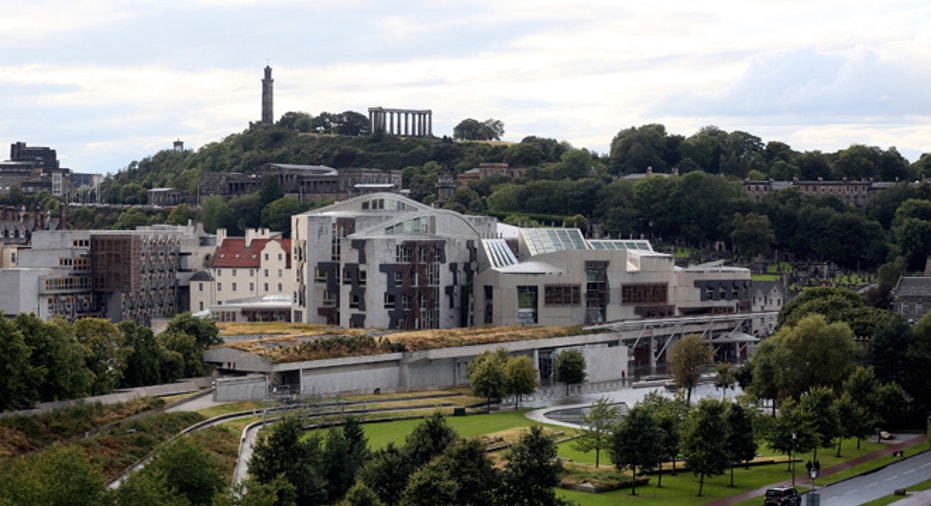Future of Scotland's Defense Enters Debate

A furious fight has broken out over the question of Scotland's future defense and its past military legacy in the final days before an independence referendum, with veterans arguing for both sides.
At the forefront of the defense issue is the fate of Britain's submarine-borne nuclear arsenal at the Royal Navy base at Faslane on the Firth of Clyde. The Scottish Nationalist Party, which has spearheaded the campaign for independence from the United Kingdom, has promised to rid Scotland of nuclear weapons if it wins Thursday's historic referendum.
Plans for a new Scottish Defence Force to be created in the event of independence have also come under fire.
A highly emotional note was sounded when a former head of Britain's armed forces said a vote to break away would be a betrayal of the Scottish soldiers who had died in Britain's wars – a comment that drew an angry response from some veterans.
Scots had died in battle to safeguard democratic freedoms, not to defend the establishment, pro-independence veterans said in an open letter.
Opinion polls show the pro-independence "Yes" camp and the unionist "No" camp running neck-and neck, although the latter has a slight edge.
The heated debate of the past few weeks has zeroed in on finances and the economy. But should the "Yes" vote win, defense matters would be a prime concern not just for Scotland and the rump United Kingdom but also for Western allies.
U.S. President Barack Obama said on Monday he wanted the United Kingdom to stay together and remain a robust ally.
Scotland has a proud military history, with kilted Highland regiments such as the Black Watch earning a fearsome reputation fighting in the British Empire's campaigns, two World Wars, and more recently in Afghanistan and Iraq.
But years of defense cuts have led to the amalgamation or disappearance of many units, a sore point in Scotland.
At the same time, the recent conflicts have been highly controversial. Nationalist leader Alex Salmond opposed the Iraq war and the pro-independence campaign has appealed to many young Scots who believe such military ventures should be a thing of the past.
In a statement for the "Better Together" campaign, more than 400 Scottish veterans, including retired generals and World War Two veterans, expressed deep concern over the SNP's plans to set up a separate Scottish Defence Force. The proposals would not provide a credible, effective force, it said.
Signatories included Colonel Ian Critchley of the Black Watch, who led the Highland Division across the Rhine in 1945, and veterans of famed regiments such as the Argyll & Sutherland Highlanders and the Royal Scots Dragoon Guards.
"As former members of the Royal Navy, British Army and Royal Air Force who are proud to call Scotland our home, we passionately believe that the people of Scotland will be stronger and more secure if we remain part of the United Kingdom," it said. "We live in an uncertain world. Our homeland and our interests overseas are subject to constant threats."
They said they were in no doubt that if Scotland was to break away from the United Kingdom, its defense would be "irresponsibly weakened".
SCOTTISH SACRIFICE
Retired Royal Navy Lieutenant Commander Colin May, a former intelligence officer at Faslane, led the counter-attack for the pro-independence campaign.
Having conventional forces at Faslane was the best option for Scotland's maritime defense and security, he said. It would make an excellent base and home for the Scottish armed forces.
Scotland would also fulfill its responsibilities for NATO, which should welcome it as a member, May said. NATO Secretary General Anders Fogh Rasmussen has said an independent Scotland would have to reapply to join the military alliance.
Retired senior British diplomat Donald MacLaren wrote that Britain had lost much of its diplomatic influence anyway and was "clinging desperately" to a seat at the top table. Scotland did not intend to rule the world as Britain once had, he said.
"More and more Scots see that Westminster's handling of defense in Scotland has been appalling. Their obsession with weapons of mass destruction being dumped on the Clyde whilst troop numbers fall to record low numbers offers no future," he said.
The former head of the British Army, Lord Richard Dannatt, added fuel to the fire when he said in the Telegraph newspaper that a "Yes" vote would betray the sacrifices of Scottish soldiers. He made particular reference to Northern Ireland, where, he said, soldiers had died to keep the United Kingdom together.
Among those hitting back at Dannatt were 102-year-old Jimmy Sinclair – a veteran of the North Africa campaign in World War Two - and Scottish government Veterans Minister Keith Brown, who served in the Royal Marines and fought in the Falklands."How dare he take their sacrifice in vain and try to turn it to political advantage - particularly having presided over the destruction of Scotland's historic regiments," they said in a open letter.
Soldiers and veterans held a variety of different views, it said.
"It is that freedom to decide matters democratically which our service men and women have helped safeguard for generations - it is not about bolstering the position of a self-serving Westminster establishment."



















